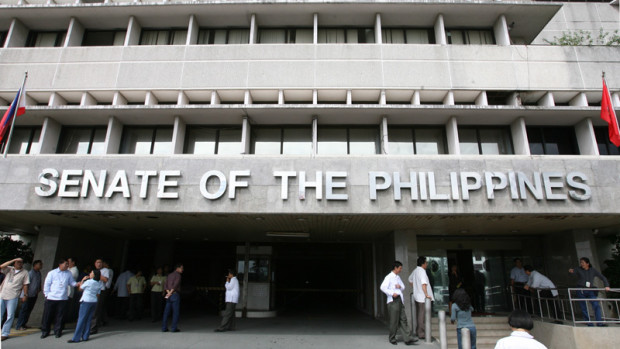Senate panel goes into executive session to tackle China’s coast guard law

Senate of the Philippines. (File photo by EDWIN BACASMAS / Philippine Daily Inquirer)
MANILA, Philippines — The Senate foreign relations committee on Thursday went into an executive session to discuss the new China coast guard law, which has earned concerns from Philippine lawmakers.
Prior to the executive session, the committee, chaired by Senator Aquilino “Koko” Pimentel III, tackled other foreign affairs matters.
At the latter part of Thursday’s hearing, Pimentel said the committee will go into an executive session to discuss “sensitive” matters.
Aside from Beijing’s coast guard law, the Senate panel will also tackle a Senate resolution filed by Senator Risa Hontiveros “urging the executive branch to exert legal and diplomatic pressure upon the Chinese government to cease all ecologically destructive activities in the West Philippine Sea and to pay reparations for the damage already done.”
“Since these two top picks are so-called ‘sensitive’ if there is no objection we can go to an executive session,” Pimentel said.
Article continues after this advertisementForeign Affairs Secretary Teodoro Locsin Jr. and officials from the Department of National Defense, the Philippine Coast Guard, the Department of Environment and Natural Resources, and the Philippine National Police maritime command will join the senators in the executive session.
Article continues after this advertisementChina law
The Department of Foreign Affairs (DFA) has already lodged a diplomatic protest against the China law, which allows Beijing’s coast guard to “take all necessary measures, including the use of weapons when national sovereignty, sovereign rights, and jurisdiction are being illegally infringed upon by foreign organizations or individuals at sea.”
Several senators have also sounded the alarm over China’s law with Senator Richard Gordon describing it as a “creeping threat that can escalate any time.”
Senator Francis Tolentino, meanwhile, said he worries for Filipino fishermen, who are possibly still not aware of this new legislation recently adopted in Beijing.
The Chinese Embassy in Manila, however, slammed “false accusations” against the law.
It insisted that the content of the law conforms with international conventions and is not targeted at any specific country.